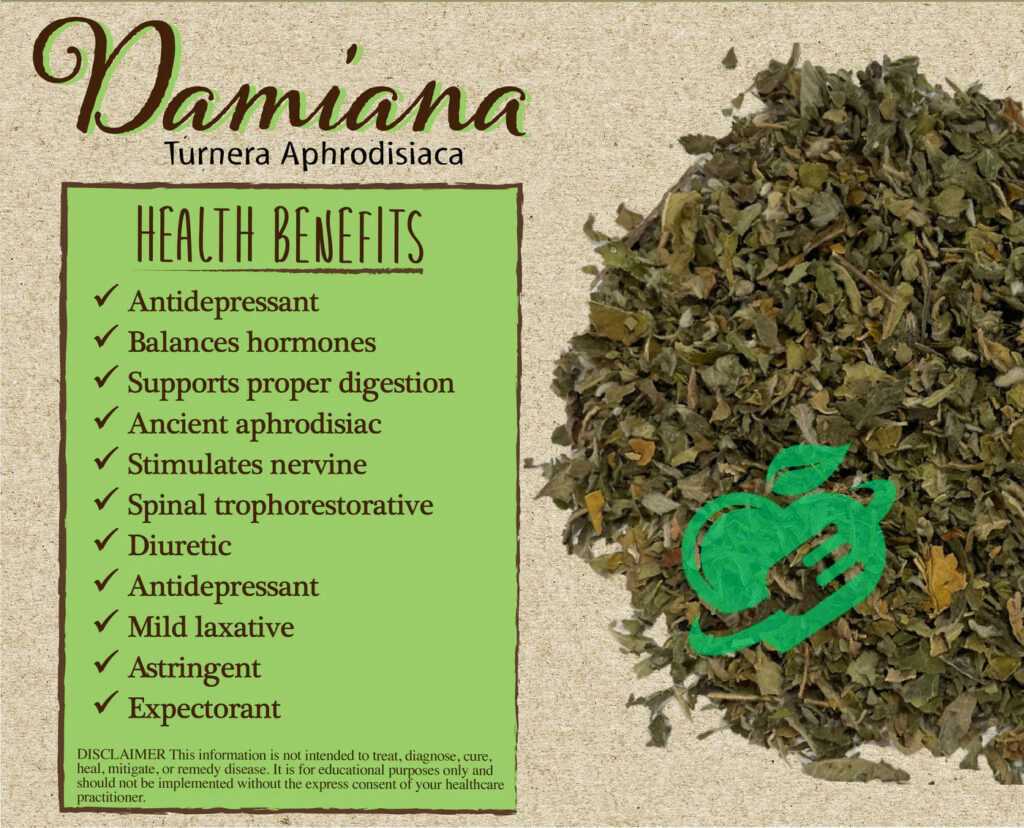Damiana Leaves Benefits You Need to Know

What are Damiana Leaves?
Damiana leaves, derived from the plant Turnera diffusa, are small, aromatic, green leaves that come from a shrub native to Mexico, Central America, and parts of the West Indies. Often described as having a mildly sweet and herbal flavor, these leaves have garnered attention for both their potential health benefits and their traditional uses. In many cultures, damiana has been revered not just as a herbal remedy but also as an aphrodisiac, with its roots deeply embedded in ancient practices. One can imagine wandering through a vibrant market in Mexico, where bundles of fresh damiana leaves catch the eye, enticing passersby with their earthy scent. People have been using these leaves for centuries, steeping them in tea, creating tinctures, or even adding them to various concoctions for both recreational and therapeutic purposes.
History and Traditional Uses of Damiana Leaves
The history of Damiana is rich and intertwined with the cultures of indigenous peoples throughout Mexico and Central America. Traditionally, these leaves were used in various forms to promote physical wellness and enhance emotional well-being. Here’s a closer look at its historical significance:
- Ancient Use: Ancient Mayans and Aztecs valued damiana not just for its medicinal properties but also as a way to elevate sexual experiences. They believed that the leaves had aphrodisiac qualities using them in rituals and ceremonies.
- Cultural Significance: In folk medicine, damiana has been utilized to treat a variety of ailments, including:
- Anxiety and depression
- Digestive disorders
- Menstrual irregularities
- Modern Herbalism: Today, damiana continues to hold its place in herbal medicine as a natural remedy for various issues. Its popularity has escalated globally, particularly in the wellness community. Many health enthusiasts incorporate damiana into their diets, looking to tap into its purported benefits.
What adds to the allure of damiana is its ability to seamlessly blend into everyday routines. Imagine sipping on a warm mug of damiana tea while enjoying a moment of quiet reflection. Personal anecdotes from individuals who have tried it often celebrate an enhanced sense of relaxation and a feeling of overall well-being. In summation, damiana leaves are not merely another herbal supplement; they are a bridge connecting modern wellness with ancient traditions. As we delve further into this blog, we will explore the nutritional value, health benefits, and various ways to incorporate this intriguing herb into daily life. The journey through history and usage serves as a powerful reminder of nature’s gifts and the wisdom ancestors passed down through generations.
Read also: How to Make Hearty Barley Beef Soup at Home.

Key Nutrients Found in Damiana Leaves
Diving into the world of damiana leaves reveals not just their historical character but also their impressive nutritional profile. While many people initially turn to Damiana for its supposed health benefits, they might not realize the wealth of nutrients these leaves contain. Some key nutrients found in damiana leaves include:
- Vitamins:
- Vitamin A: Essential for maintaining good vision and immune function.
- Vitamin B-complex: Various B vitamins aid in energy production, brain function, and the synthesis of hormones.
- Minerals:
- Calcium: Vital for bone health and muscle function.
- Iron: Necessary for transporting oxygen in the blood and preventing anemia.
- Magnesium: Supports muscle and nerve function, as well as energy production.
- Fiber: Aiding digestion and contributing to a healthy gut, the fiber content in damiana can help promote regularity and enhance nutrient absorption.
Individuals who incorporate damiana into their diets often acknowledge a more balanced digestive system and enhanced energy levels. Imagine starting your morning with a cup of damiana tea. As you sip, not only do you enjoy the taste, but you also benefit from these essential nutrients working synergistically in your body!
The main active compounds in Damiana leaves
Beyond its impressive nutrient list, damiana leaves are composed of several active compounds that contribute to their therapeutic effects. Understanding these compounds can provide insights into how damiana interacts with the body.
- Flavonoids:
- These antioxidants help combat oxidative stress and have potential anti-inflammatory properties. An example is quercetin, known for its immune-boosting effects.
- Terpenes:
- Found in many plants, terpenes like camphor and cineole can influence mood and relaxation, aligning with Damiana’s use as a natural remedy for stress and anxiety.
- Alkaloids:
- Compounds such as damiana and arbutin may play a role in enhancing libido and improving sexual function, which are pivotal elements of damiana’s traditional uses.
- Tannins:
- With their astringent properties, tannins may help in gut health by promoting a balanced digestive environment.
When exploring Damiana, it’s fascinating to think about how these active compounds work together, carrying on the legacy of traditional herbal medicine into modern health practices. Such synergy could explain the holistic wellness benefits reported by users, leaving them feeling rejuvenated and balanced. In summary, the nutritional value and chemical composition of damiana leaves offer much more than meets the eye. They are a wonderful example of how nature provides us with powerful elements that have been cherished throughout history, making them an essential topic for anyone interested in natural health solutions.
Read also: The Power of Clove Tea: Flavor and Health Combined.

Health Benefits of Damiana Leaves
One of the most well-known benefits of damiana leaves lies in their potential to enhance libido and improve sexual function. Traditionally used as an aphrodisiac, damiana has a storied history of increasing sexual desire among people.
- Aphrodisiac Properties: Many users have reported heightened sensitivity and increased pleasure during intimate moments after incorporating damiana into their routines. This can be particularly empowering for those experiencing a dip in libido due to stress or hormonal changes.
- Testimonial Insight: Take Sarah, for instance, who began brewing damiana tea each afternoon. She shared how it not only sparked her interest in intimacy but also fostered a deeper connection with her partner. This anecdote aligns with Diana’s historical uses, suggesting that many have similarly benefited.
- Blood Flow and Hormonal Balance: Some studies suggest that damiana may enhance blood circulation and support hormonal balance, further contributing to improved sexual health.
Incorporating damiana could be a simple and enjoyable way to rekindle that spark, making it a go-to choice for those looking to enhance their intimate experiences.
Stress Relief and Mood Enhancement
In today’s fast-paced world, finding natural ways to manage stress is essential for overall wellness. Damiana leaves come to the rescue here as well, often celebrated for their calming effects.
- Natural Relaxant: Many users find that Damiana acts as a gentle relaxant, helping ease anxiety and promoting a sense of tranquility. Picture winding down after a long day, sipping a warm cup of damiana tea, feeling the worries of the day gently drift away.
- Mood-Boosting Qualities: The compounds in damiana, including flavonoids and terpenes, are believed to positively influence levels of serotonin and dopamine, two neurotransmitters crucial for mood regulation. By supporting a balanced emotional state, damiana helps foster a more positive outlook on life.
- Real-Life Example: John, who faced daily pressures at work, began integrating Damiana into his morning routine. He reported feeling more focused and less overwhelmed by the tasks ahead, showcasing how a simple herbal addition can transform one’s day.
Digestive Health Support
The benefits of damiana extend beyond emotional and sexual wellness to encompass digestive health support, an essential aspect of overall well-being.
- Aiding Digestion: Damiana has been used traditionally to alleviate digestive issues, including bloating and constipation. Its fiber content promotes regular bowel movements and a healthy gut microbiome.
- Antioxidant Content: The antioxidants found in damiana can combat oxidative stress and inflammation in the digestive tract. This protective effect may contribute to a healthier gastrointestinal system.
Imagine enjoying a delicious meal and later savoring a cup of damiana tea to aid digestion. This combination not only enhances enjoyment but also supports a balanced digestive process. In conclusion, the health benefits associated with damiana leaves are diverse and compelling. From boosting libido to relieving stress and supporting digestive health, damiana offers a holistic approach to well-being, seamlessly blending ancient wisdom with everyday modern life.
Read also: The Ultimate Guide to Bhringraj: How This Herb Can Transform Your Health.

Possible Side Effects and Precautions of Damiana Leaves
While damiana leaves offer an array of health benefits, it is crucial to approach any herbal supplement with caution. Just as with any natural remedy, there can be side effects and potential interactions.
- Allergic Reactions: Some individuals may experience allergic reactions to damiana. Common symptoms can include skin rashes, itching, or respiratory issues. If you have a known allergy to plants in the Passifloraceae family, it’s wise to consult a healthcare provider before trying Damianaa.
- Drug Interactions: Damiana may interact with certain medications, especially those affecting hormonal levels or blood sugar. For example:
- It may enhance the effects of sedatives or anti-anxiety medications, leading to increased drowsiness.
- Individuals on blood sugar medication should be cautious, as damiana could affect insulin sensitivity.
- Real-Life Example: Mary, who was eager to incorporate Diana into her wellness routine, experienced slight dizziness after her first dose. Upon consulting her doctor, she learned that this reaction was likely due to its mild sedative effects combined with her existing medication for anxiety. This highlights the importance of being aware of one’s health conditions and seeking professional advice.
Safe Dosage Recommendations
Determining the right dosage of damiana is a crucial step for enjoying its benefits without experiencing side effects. Understanding what constitutes a safe intake can help maximize the positive effects while minimizing risks.
- General Guidelines:
- Tea: Steeping 1 to 2 teaspoons of dried damiana leaves in a cup of hot water for 10-15 minutes is a common practice. Consuming 2 to 3 cups a day can be an effective way to enjoy its benefits.
- Tinctures: If using liquid extracts, the commonly recommended dose is approximately 1 to 2 ml, taken two to three times per day.
- Caution for Pregnant or Nursing Women: Pregnant or nursing women need to avoid damiana, as there is insufficient research on its safety during these periods.
- Starting Slow: As with any new supplement, it’s wise to start with a lower dose and gradually increase based on personal tolerance. For instance, trying a single cup of damiana tea and observing how your body responds can help gauge its effects without overwhelming your system.
In summary, while damiana leaves can offer a plethora of health benefits, it is vital to proceed with awareness and caution. By understanding potential allergic reactions, drug interactions, and adhering to recommended dosage guidelines, individuals can safely incorporate this herbal remedy into their wellness journey. It’s always a good practice to prioritize health and safety, ensuring a positive experience with any new addition to one’s routine.
Read also: How to Treat and Soothe Nettle Sting.

How to Incorporate Damiana Leaves into Your Routine?
Incorporating damiana leaves into your daily routine can be both enjoyable and beneficial. One of the most popular methods is to brew them into a calming tea. The ritual of preparing and sipping damiana tea can become a delightful part of your day, providing not just health benefits but also a moment of relaxation.
- Basic Damiana Tea Recipe:
- Ingredients:
- 1 to 2 teaspoons of dried damiana leaves
- 1 cup of boiling water
- Optional: sweeteners like honey or spices like cinnamon for added flavor
- Instructions:
- Place the dried damiana leaves in a teapot or tea infuser.
- Pour boiling water over the leaves and let it steep for 10-15 minutes.
- Strain the leaves or remove the infuser.
- Add honey or cinnamon if desired, and enjoy your soothing cup of damiana tea.
- Ingredients:
- Creative Variations:
- Damiana Herbal Blend: Combine damiana with other soothing herbs like chamomile or lemon balm for an aromatic infusion that promotes relaxation and improves sleep quality.
- Iced Damiana Tea: For a refreshing twist, brew the tea as instructed, then chill it in the refrigerator. Serve over ice with lemon slices for a revitalizing summer drink.
Many people, including herbal enthusiasts, enjoy playing around with different recipes until they find their perfect blend. This not only makes taking Damiana more enjoyable but can also encourage friends and family to join in on the wellness journey.
Supplement Forms and Dosage Guidelines
For those who prefer a more straightforward approach or don’t enjoy herbal teas, damiana is also available in various supplement forms. Here’s a helpful breakdown:
- Capsules and Tablets:
- A convenient option for those on the go, these usually contain powdered damiana leaves and can simply be taken with water. Typical dosages range from 300 to 600 mg, taken one to three times daily.
- Liquid Extracts or Tinctures:
- These concentrated forms can be more potent and allow for quicker absorption. A common recommendation is 1 to 2 ml taken two to three times daily, depending on individual tolerance.
- Dosage Tips:
- Always read the product label to ensure proper usage and recommended dosages.
- For those new to Damiana, starting with a lower dose is advisable to assess tolerance and effect.
As Julia shared her experience, “I started with damiana capsules, and within a week, I noticed an improvement in my mood and energy levels.” Her story reflects the positive outcomes many have experienced by incorporating this herbal supplement into their daily lives. In conclusion, whether through a comforting cup of tea or convenient capsules, adding damiana leaves to your daily routine can be a pleasurable and health-enhancing endeavor. By exploring various forms and creations, you can uncover the best way to embrace the benefits of this remarkable herb, fostering well-being as part of your lifestyle.
Read also: Unlocking the Nutritional Value of Guava Leaves for Well-being.

Research and Evidence Supporting Damiana Leaves Benefits
As interest in natural remedies continues to rise, the scientific community has taken an increasing interest in the health benefits of damiana leaves. Numerous studies have been conducted to explore its effects on various health aspects.
- Libido Enhancement: Research indicates that damiana may positively influence sexual function. A study published in the Archives of Sexual Behavior highlighted how the herb reportedly improved sexual desire in human beings. Participants noted a significant boost in libido after consistent usage. 1.
- Anxiety and Stress Relief: Another notable study focused on the anxiolytic (anxiety-reducing) properties of damiana. The research found that subjects who consumed damiana extract experienced lower levels of anxiety and better overall mood. This aligns with many anecdotal experiences where users report increased calmness and reduced tension. 2.
- Digestive Support: Research evaluating Damiana’s impact on digestion suggests that the herb can foster a healthy gut by promoting regular bowel movements and alleviating symptoms of digestive disorders. Its high fiber content plays a crucial role, as fiber is known for its ability to enhance gut health. 3.
While these studies provide an encouraging glimpse into the benefits of damiana, more extensive research is still needed to fully understand its mechanisms and long-term effects. Nevertheless, personal testimonials from individuals who’ve incorporated damiana into their routines often echo these findings, creating a compelling narrative about its advantages.
Read also: Uncovering the Truth: Does Ginger Really Help with Weight Loss?
Future Potential in Health and Wellness Fields
The promising results from research on damiana reflect the herb’s potential in various health and wellness fields. With a growing trend toward natural remedies and holistic health, damiana might emerge as a key element in these areas.
- Integrative Medicine: As more practitioners explore herbal formulations, damiana could find a place in integrative treatment approaches, potentially complementing traditional therapies for anxiety, sexual health, and digestive issues.
- Health Supplement Market: The demand for natural supplements continues to rise. This could lead to the creation of new products, enhancing accessibility for consumers seeking natural alternatives. Manufacturers might develop innovative formulations combining damiana with other herbs for enhanced health effects.
- Holistic Wellness Initiatives: Programs focusing on mental health, stress management, and sexual wellness could incorporate Damiana as a central component, encouraging its use in workshops, retreats, or wellness coaching.
- Personal Anecdote: Sarah, who has been part of a wellness group, noticed that discussions around Diana have become increasingly common. “Everyone seems interested in finding natural ways to address their challenges, and Damiana often comes up as a great option,” she shared.
Frequently asked questions
Is Damiana good for you to Lose Weight?
Preliminary studies indicate that using a particular blend of damiana, guarana, and yerba mate could help decrease body weight in individuals who are higher weight. 4.
Who should not take Damiana?
Damiana may influence blood sugar levels. If you have diabetes, monitor your blood sugar levels closely. Be alert for symptoms of low blood sugar (hypoglycemia), which can include headache, hunger, sweating, confusion, irritability, dizziness, or shakiness. Pregnant individuals should avoid using this product unless advised by a medical professional. 5.
What does Damiana do for skin?
The findings indicated that Damiana leaves significantly reduced photoaging caused by UVB exposure by modulating the MMP-1/procollagen type I, TGF-β1/Smad, and MAPK pathways associated with skin aging. Additionally, it was found that Damiana leaves were capable of suppressing the UVB-triggered AP-1 mechanism and stimulating the Nrf2 pathway. 6.
Does Damiana help you sleep?
For centuries, Damiana has been utilized in Mexico and Central America for its soothing properties, which can aid in promoting sleep and reducing nervous tension. It’s evident that there is a link between depression, anxiety, and impotence, and you don’t need a scientific background to recognize it. 7.
How much damiana per day?
People can drink three cups (750 ml) per day. To use in tincture form, take 1/2–3/4 teaspoon (2–3 ml) three times daily. Tablets or capsules (400–800 mg three times per day) may also be used. Damiana is commonly used in herbal combinations. 8.
Is Damiana safe for the liver?
Pregnant and breastfeeding women, as well as individuals with liver problems, should avoid using damiana. High doses of damiana may lead to hallucinations. If you do experience hallucinations while using Damiana, remain calm and seek medical assistance promptly. 9.
Because your health is the most valuable thing you have and the most precious thing we care about, we always recommend that you consult your specialist doctor in everything related to your health and daily life. Everything we provide here is for awareness purposes only and does not replace consulting a doctor. Every person has a unique condition that deserves special care, and we are here by your side, working passionately to provide the information you need. Always follow us, because we write for you with love and sincerity to remain a source that inspires you with hope and supports you on your journey towards a better life.



